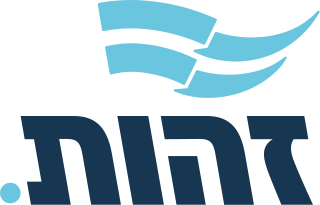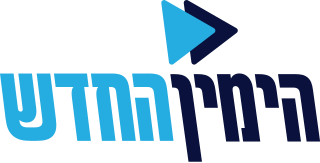| Part of a series on the |
 |
|---|
The September 2019 Israeli legislative election was held using closed list proportional representation. Each party presented a list of candidates to the Central Elections Committee prior to the election.
| Part of a series on the |
 |
|---|
The September 2019 Israeli legislative election was held using closed list proportional representation. Each party presented a list of candidates to the Central Elections Committee prior to the election.
The Blue and White list is headed by Benny Gantz and Yair Lapid; the list (up to the 30th slot) remains the same as in the April election. [1] [2]
The Democratic Union list is headed by Nitzan Horowitz. [3]
The Joint List is headed by Ayman Odeh. [4]
The Labor-Gesher list is headed by Amir Peretz. [5] [6]
The Likud list is headed by Prime Minister Benjamin Netanyahu. [7]
The Otzma Yehudit list is headed by Itamar Ben-Gvir. [8] [9] Baruch Marzel and Ben-Zion Gopstein were barred from running on 25 August 2019 by the Supreme Court of Israel. [10]
The Shas list is headed by Minister of the Interior Aryeh Deri. [12]
The United Torah Judaism list represents the Agudat Yisrael and Degel HaTorah parties, which have run jointly since 1992. The list is headed by Yaakov Litzman, and is identical to the April 2019 list.
The Yamina list is headed by Ayelet Shaked. [13] It is an alliance of the New Right and the Union of the Right-Wing Parties (URWP).
The Yisrael Beitenu list is headed by Avigdor Lieberman. [14]
The Zehut list was headed by Moshe Feiglin, [15] though Feiglin announced on 29 August that it would pull out of the race in return for a ministerial position and a push for the legalization of medical cannabis, pending a ratification of the agreement by Zehut members, [16] which was approved on 1 September. [17] On 3 September, the entire Zehut list withdrew from the elections, effectively eliminating the party's candidacy.
Minor parties in the order in which they registered with the Central Elections Committee. [1]
Liberalism in Israel has played a role since the country's founding.
Elections for the 12th Knesset were held in Israel on 1 November 1988. Voter turnout was 79.7%.
Elections for the 13th Knesset were held in Israel on 23 June 1992. The election resulted in the formation of a Labor government, led by Yitzhak Rabin, helped by the failure of several small right wing parties to pass the electoral threshold. Voter turnout was 77.4%.
Early elections for the nineteenth Knesset were held in Israel on 22 January 2013. Public debate over the Tal Law had nearly led to early elections in 2012, but they were aborted at the last moment after Kadima briefly joined the government. The elections were later called in early October 2012 after failure to agree on the budget for the 2013 fiscal year.
Politics in Israel are dominated by Zionist parties. They traditionally fall into three camps, the first two being the largest: Labor Zionism, Revisionist Zionism and Religious Zionism. There are also several non-Zionist Orthodox religious parties and non-Zionist secular left-wing groups, as well as non-Zionist and anti-Zionist Israeli Arab parties.
Early legislative elections were held in Israel on 9 April 2019 to elect the 120 members of the 21st Knesset. Elections had been due in November 2019, but were brought forward following a dispute between members of the current government over a bill on national service for the ultra-Orthodox population, as well as impending corruption charges against incumbent Prime Minister Benjamin Netanyahu.

Zehut was a right-libertarian and nationalist political party in Israel founded in 2015 by Moshe Feiglin. Its platform was centered around promoting individual liberty, including economic freedom, and annexing the West Bank. The party also advocated for legalization of cannabis.
In the run-up to the April 2019 Israeli legislative election, which was held on 9 April, various organisations carried out opinion polling to gauge voting intentions in Israel. Results of such polls are displayed in this article, ranging from the previous legislative election, held on 17 March 2015, to the 2019 election.
In Israeli politics, the national camp or right-wing bloc is an informal coalition of nationalist and right-wing, religious conservative political parties that since 1977 has frequently co-operated to form governments.
Snap legislative elections were held in Israel on 17 September 2019 to elect the 120 members of the 22nd Knesset. Following the previous elections in April, incumbent Prime Minister Benjamin Netanyahu failed to form a governing coalition for a second consecutive time. On 30 May, the Knesset voted to dissolve itself and trigger new elections, in order to prevent Blue and White party leader Benny Gantz from being appointed Prime Minister-designate. This election marked the first time the Knesset voted to dissolve itself before a government had been formed.
Polling for the 17 September 2019 Israeli legislative election began on 26 May 2019.

The New Right is a right-wing political party in Israel, established in December 2018 by Ayelet Shaked and Naftali Bennett. The New Right aims to be a right-wing party open to both religious and secular people. The party did not win any seats in the April 2019 election, though it won three seats in the subsequent election of September 2019, retained these in the March 2020 election and increased to seven seats in the 2021 Israeli legislative election. It is currently the sole member of the Yamina alliance.
Blue and White is a centrist and liberal political alliance in Israel. It was established by the Israel Resilience Party, Yesh Atid and Telem to run in the April 2019 Knesset election, in hopes of defeating Prime Minister Benjamin Netanyahu. Blue and White defines itself as a pluralistic alliance representing all citizens on the political and religious spectrums. The phrase "blue and white" refers to the colors of the Israeli flag, and is colloquially used to describe something as being typically Israeli.
Legislative elections were held in Israel on 2 March 2020 to elect members of the twenty-third Knesset. The result was initially a stalemate, which was resolved when Likud and Blue & White reached a coalition agreement. Under the terms of the agreement, the premiership would rotate between Benjamin Netanyahu and Benny Gantz, with Gantz given the new position of Alternate Prime Minister until November 2021. These elections followed the continued political deadlock after the April and September 2019 Knesset elections.
In the run up to the 2020 Israeli legislative election, various organisations carry out opinion polling to gauge voting intention in Israel during the term of the 22nd Knesset. This article lists the results of such polls.
Legislative elections were held in Israel on 23 March 2021 to elect the 120 members of the 24th Knesset. It was the fourth Knesset election in two years, amidst the continued political deadlock following the previous three elections in April 2019, September 2019 and 2020. Yair Lapid and Naftali Bennett announced that they had formed a rotation government on 2 June 2021, which was approved on 13 June 2021.
The 2020 Israeli legislative election was held using closed list proportional representation. Each party presented a list of candidates to the Central Elections Committee prior to the election. If a list contains more than 40 people, only the first 40 are shown.
Legislative elections were held in Israel on 1 November 2022 to elect the 120 members of the 25th Knesset. The results saw the right-wing national camp of former prime minister Benjamin Netanyahu win a parliamentary majority, amid losses for left-wing and Arab parties, as well as gains by the far right.
The 2021 Israeli legislative election was held using closed list proportional representation. Each party presented a list of candidates to the Central Elections Committee prior to the election.
The 2022 Israeli legislative election was held using closed list proportional representation. Each party presented a list of candidates to the Central Elections Committee prior to the election.